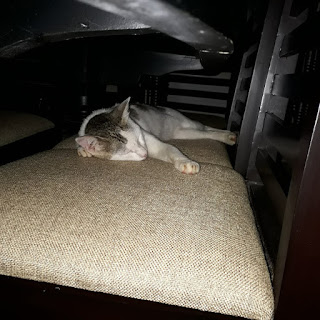How to keep pets and cleanliness
 |
| My Dictator |
French writer Anatole
France was of the opinion that “Until one has loved an animal a part of one’s
soul remains unawakened.” I would have laughed at him until a few months back.
Animals were a strict no
for me until a kitten walked into my life quite unexpectedly. I used to
associate animals with filth and I was fastidious about cleanliness inside and
around my home. Maggie was even more fastidious than me. So when Kittu came
along we naturally kept him outside the house. We fed him regularly but he
meant nothing more to us than an animal that had to be kept off our personal
limits.
Eventually, however, we
started buying the food which he liked keeping aside our own tastes. It was
then that Maggie and I started realising that Kittu had become an integral part
of our meagre family. He soon found his place inside the house. Within no time
he became the master of the house. Both Maggie and I wondered how we learnt to
tolerate his omnipresent dictatorship.
We could never drive him
out simply because he had stolen our hearts. Instead of driving him out, I
searched for ways of keeping the house clean while having a cat as a pet. I
learnt to clean my sofas and chairs by sprinkling baking soda liberally on them
and vacuum cleaning the furniture thoroughly after half an hour. I learnt to
observe Kittu’s eating habits and to buy the food he loves. I visited the
supermarket just for his sake. My friend in the village considers me mad. He
doesn’t understand what the cat means to me.
The cat has taught me the
meaning of love. My friend loves dogs because dogs are faithful. Dogs will die
for you. Kittu enjoys all the attention I lavish on him and then he vanishes
entirely for hours to return only when he needs me again for his food. Unlike a
dog, he is not at all obedient. He doesn’t even let me clean him when he returns
home. He has his own cleaning mechanism which he doesn’t like to be meddled
with. He is a little dictator.
He is my alter ego,
Maggie says. That’s quite true too. But that’s not why I love him. I love him
because he has stirred certain depths of my soul. He has taught me the nuances
of love. He has taught me to love him in spite of what he is. He may love me in
return or he may not: that’s entirely his choice, I have no say in that
whatever. And I love giving that liberty to him.
I learn to love by giving
that liberty to the other person to be him-/herself. Love makes no demands. No
conditions. Love gives. That’s all. Love endures the rest.
Is it possible to do the
same with human beings? It is easy to deal with pets provided you are willing
to spare enough time to clean up the mess they make occasionally. What about
human beings? Honestly, I have done the
same with my students and got fantastic rewards. Human beings love you much
more than cats and dogs when you let them be themselves. Help them be
themselves. That is love: letting the other be, be him-/herself. Love is the
process of awakening the soul: your own and the loved one’s.

Having a pet is like adopting a child to home. I understand the feeling because id do have 2 pet birds.
ReplyDeleteExactly. The pet is as demanding as a child.
DeleteIt is nice to read about this unique experience. I don't know if human beings deserve this kind of love. It's difficult when a person betrays you in the name of friendship. And I don't know how to love such a person.
ReplyDeleteHuman beings are capable of profound love. Gods and politicians destroy that ability.
Delete